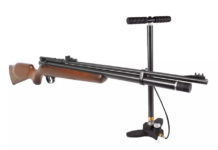Todd Amenrud
Game wardens have a difficult, often dangerous job with every person met unique and each state of affairs distinctive. Add to all that the stress from the high probability that the person they’re encountering is armed with a firearm or knife! Let’s make their lives easier. If you are approached by a game warden, usually all you have to do is keep quiet and listen to their instructions. The warden should treat you courteously, but remember, he or she has the right to search. Because of the nature of their job and the low probability of being able to obtain a warrant in a timely manner, wardens in most states have extended search and seizure powers.

As long as both parties show each other the proper respect, there should never be a problem. However, here are some general guidelines:
If You’re Hunting
When a warden(s) is/are checking hunters, they are concerned with firearm safety and compliance with hunting regulations. When a game warden approaches, you should:
- Treat each firearm as if it were loaded.
- Go back to the first rule. Point the muzzle of your firearm in a safe direction away from the approaching game warden.
- If you did not unload your firearm when you first noticed the warden, do NOT attempt to load or unload your firearm in their presence unless directed to do so.
- First rule…make sure your safety is on, and keep your finger away from the trigger!
- Obey all of the conservation officer’s instructions.
- The main things are to “observe perfect firearms safety” and “keep your ears open.” Listen to their instructions. If you show them respect, it will likely be returned.
A Game Warden may perform a stop of your ATV, boat or vehicle either by signaling you to stop with an obvious body gesture or with emergency blue lights and/or siren. Conservation officers will make themselves known by identifying themselves verbally and while in uniform or by providing a badge or State law enforcement credential.
When signaled to stop by a game warden:
- As soon as safely possible, bring your vehicle to a complete stop and allow the game warden to approach you. Failure to stop can result in criminal prosecution, significant fines, and arrest.
- Be courteous and follow the game warden’s instructions pertaining to the vehicle inspection. Your cooperation will expedite the inspection process, and they will have you back on your way as quickly as possible.
While Fishing & Boating Similar to when a warden checks a hunter, when checking anglers they are concerned with boating safety and compliance with fishing regulations. If you’re approached by a Conservation Officer in a patrol boat, you should:
- Initially, maintain your current speed and direction, unless the patrol boat signals you to do otherwise (flashing blue lights are a signal for you to stop). Obviously continuing your speed and direction will help to avoid a crash.
- If you’re fishing, reel in all fishing lines so their boat may approach.
- Make certain that rod tips and other equipment are clear of the space between boats. To prevent damage to the boats, it’s a good idea to put out bumpers or an extra life vest for a cushion between the boats. Most often the conservation officer’s boat will already have bumpers, but we’re trying to be friendly.
Whether they are State or Federal Game Wardens, they all prefer to have pleasant interactions with outdoor enthusiasts. So be polite and courteous, promptly comply with all their requests, and don’t forget, these people are professionals and know the outdoors. If you’re having a bad day in the field, you can often ask them for advice or helpful tips. Again, when treated with courtesy and respect they’re often happy to share their knowledge!











































